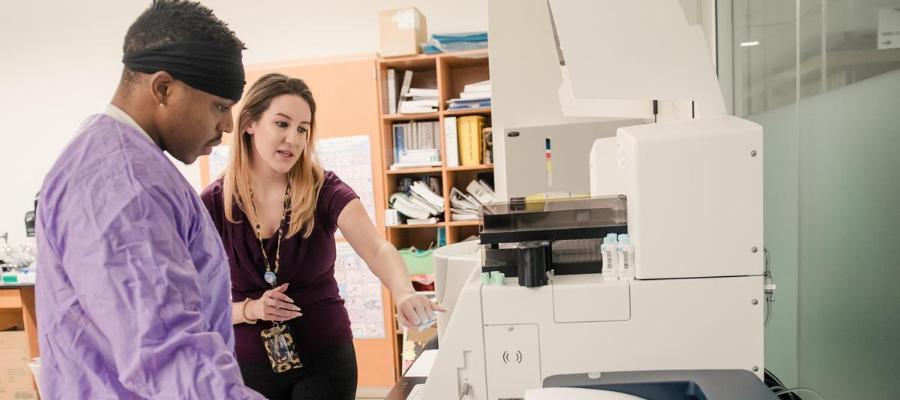Student working with teacher on medical equipment, student working on medical equipment, students talking and laughing together, student using calculator, student putting on scrubs, and student working with teacher on medical equipment.

Medical laboratory technicians analyze blood, body fluids and microbiology cultures; work up blood units for transfusions; operate automated equipment, instruments and analyzers; and conduct manual testing in accordance with federal laws, guidelines and national standards. It is an ever-changing and challenging career that you can take anywhere in the United States. Upon graduation, you can be credentialed as a medical laboratory technician by the American Society of Clinical Pathology Board of Certification.
The School of Health Sciences offers the following Associate of Applied Science (A.A.S.) degree. Maryland refers to the A.A.S. as a career degree, because it's intended to provide you with skills to enter the workforce.
In the Medical Laboratory Technician program, you will learn about the immune system, blood cells and blood banking procedures. In the clinical chemistry laboratory, you learn how to diagnose bacteria in patient samples and analyze samples for drugs of abuse, cholesterol and glucose. In your second spring term, you will rotate through four different hospital or clinical laboratory departments.
Upon graduation of the Medical Laboratory Technician program, you will be prepared to take a national credentialing examination.
Medical Laboratory Technician (A.A.S.) in the AACC Catalog.
The following certificate program prepares students for employment and feeds into the Associate of Applied Science degree, if desired.
The Medical Laboratory Assistant (MLA) 29-credit certificate program provides the education needed to prepare you as a trained MLA in a variety of clinical laboratory settings including hospitals, clinics and physician office laboratories. You will learn the practical skills needed to excel as an MLA in in-patient and out-patient phlebotomy and processing, blood donor phlebotomy and processing, specimen accessioning, Point-of-Care and Clinical Laboratory Improvement Amendment (CLIA ’88) waived testing, and computer and customer service skills. The MLA program includes a 100-hour practicum and serves as a career ladder from AACC’s Phlebotomy Letter of Recognition into the MLA certificate and then to the Associate of Applied Science (A.A.S.) medical laboratory technician (MLT) degree.
Graduates will qualify for entry-level specimen processor positions in the clinical laboratory sector. Upon completion of this program, you are eligible to apply for national certification as a medical laboratory assistant through the American Society for Clinical Pathology (ASCP).
You can complete this certificate for less than $5,000.
Medical Laboratory Assistant (certificate) in the AACC Catalog.
The Phlebotomy Technician Letter of Recognition is 12 credits and teaches the principles and practice of venipuncture, skin puncturing and processing of samples for laboratory testing. Topics include venipuncture theory and techniques, concepts of cardiovascular anatomy and physiology, terminology and an introduction to standard hospital laboratory tests.
If you decide to earn your A.A.S. degree as a medical laboratory technician, you can transfer to complete your four-year degree. We have partnerships and transfer agreements in place with many colleges and universities so you can easily transfer when you're ready. Transfer agreements (or articulation agreements, as they’re officially called) are formal arrangements between institutions that allow certain credits to transfer seamlessly from one school to the other. You can work with a transfer advisor to set up a specific plan to transfer to the four-year school of your choice.
Paying for college should be simple! Scholarships are available for the medical laboratory technicians of tomorrow.